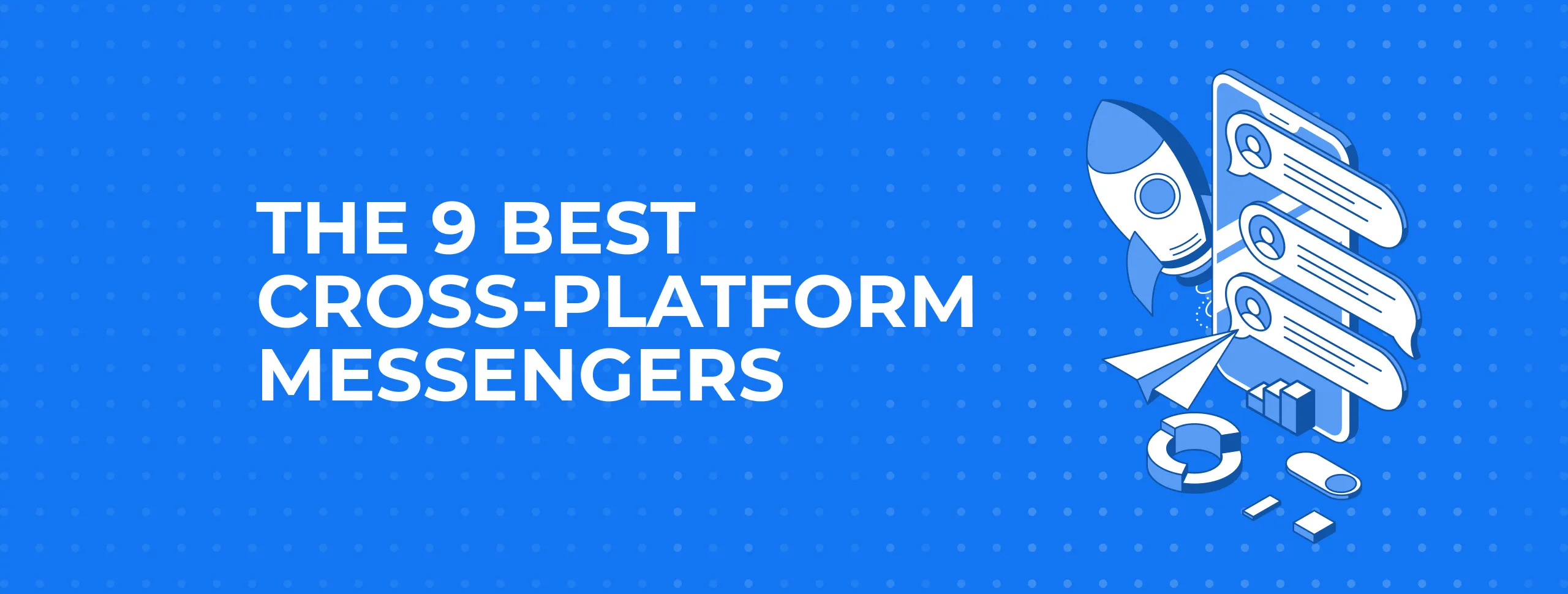
The 9 Best Cross-Platform Messengers

What are messengers? A “messenger” is a simple program for exchanging text messages, videos and photographs. These programs have taken root among active mobile users, and their growing influence can be seen in a number of spheres.
Email communication is such an integral part of business culture, that it can difficult to imagine it being replaced; however, messengers have come a long way since the early days of ICQ and Yahoo messenger, and business users are taking note. For the commerce-minded among us, messengers need to serve a few key functions. They have had to be able to receive and accept important information on time, aid the user in keeping up with the news and allow groups to conduct meetings, negotiations, etc. remotely. Messengers were initially just software you could install on a computer, which limited them and their business possibilities. But since they have taken new form as mobile apps, there has been new opportunity, enthusiasm and investment.
Below we have collected the top 9 cross-platform messengers around the globe.
WhatsApp may have become the most popular messenger worldwide, with an audience of over a billion users. Built using the Erlang programming language, WhatsApp appeared in 2009, before being bought in 2013 by Facebook, who has owned it ever since. This app has gone ad-free, and all it takes to use it is a simple download and registration using a phone number. Once you’ve done that, WhatsApp automatically synchronises with your phonebook, and then you can write text messages, make calls, and send and receive multimedia files. In 2015, WhatsApp launched a web client of their mobile app, called WhatsApp Web. At the same time, despite its popularity, this messenger has had some serious problems with security. Fortunately, they have made big changes, and the latest version allegedly provides end-to-end encryption and privacy.
Messenger (the official Facebook messenger)
Messenger was built for the rapid exchange of messages and files and integrated with Facebook Chat in 2011. Messenger is available for a number of mobile platforms (iOS, Android, BlackBerry, Windows phone), in addition to its web version. Through Messenger, users experience Facebook chats in real time. Facebook is heavily promoting this application as a place where users can, send files and make free VoIP calls. For marketing professionals, there is good news as well: as of April 2016, Messenger supports bots, so you can generate the right types of news and ads on Messenger.
WeChat is a messenger from the Chinese company Tencent. Their audience includes about 700 million users, both in and outside of China, and is available on mobile devices and the web. Functionally, WeChat is quite similar to other messenger services, but where it is quite unique is its distinctive feature for chatting with strangers. The way it works is you shake your phone and WeChat sends you a new friend to chat with at random.
WeChat has integrated with social networks, and it also works for electronic payments and money transfers. Additionally, the app has a business version, Enterprise WeChat, built specifically for companies, employees and communications between business partners.
Viber
Viber provides free VoIP calls, but also allows users to exchange text messages and share multimedia files. Initially Viber was only available for iPhone, but it has since expanded and become famous as a cross-platform application. With the “Viber Out” function, you can call mobile and landline numbers at a low rate. All in all, users usually choose Viber for its high quality of communication and quick delivery of text messages and files.
Skype
Skype needs no introduction. One of the oldest applications for online video and voice calls, Skype was launched thirteen years ago, and today it counts more than 300 million users. Skype works with different mobile gadgets and computer systems, which is one reason so many companies use this messenger for corporate connections. Its main advantages are its low-cost calls to mobile and landlines, simplicity in calling abroad and the ability to hold a video or voice conference between small and large groups.
Slack
Slack is a convenient corporate messenger, a collaboration tool which suits large companies with multiple departments and a large staff. Users can only join through invitation. Slack has its own hosting and is integrated with such services as Google Drive, Dropbox, GitHub, Twitter, Trello, Jira and others. The free version allows administrators to create groups, where they can add an unlimited number of users and archive up to 10,000 messages.
Telegram
Telegram is one of WhatsApp’s main competitors, and it is a fast-growing messenger which first launched in 2013. Its creators are dedicated to the idea that Telegram is and will always remain a free app for its users. Moreover, Telegram is reported to be the most secure messenger because of the encryption system it uses for “secret chats”. Telegram has several impressive features, such as being able to store passwords and automate processes, as well as a loyal following - users argue that Telegram sends messages faster than WhatsApp.
Signal (Private Messenger)
Signal is all about security. A messenger that is in many ways reminiscent of other apps in interface and functionality, Signal encrypts everything. That means all chats and calls are and stay private. While keeping correspondence safe, Signal performs all traditional tasks of a messenger, such as syncing your contacts from your phone number, and it is available in every country.
Line
Line is a messaging application that is popular primarily in Asia. It provides video calls, voice calls, and text messaging, but its major features are different. Line users collect free and paid stickers and lets users play games (Line Games) through the app. Line also has its own built-in social network and is connected to several other applications, offering additional games, photo-editors and utilities.
Using the right messenger can open up many doors, thanks to their functionality, and help us navigate those opportunities with simple and accessible interfaces. Beyond that, many have taken great steps towards improved security, meaning improved communications and improved business.





